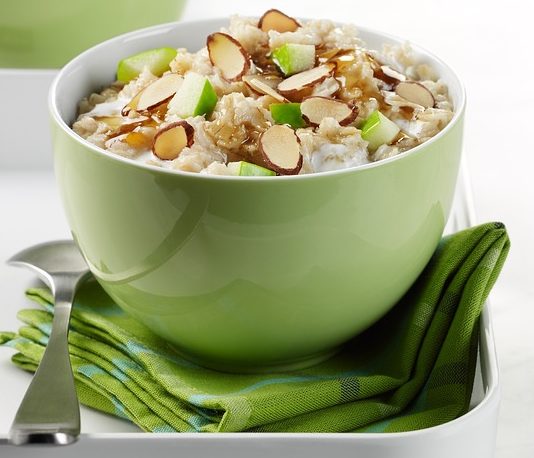5 Myths About Carbs you Should Stop Believing

by Abby Austin
Getting rid of a bad reputation can be a challenge – something carbs know all too well. Demonized for years and years, athletes and bodybuilders alike often label carbs as their worst enemy. From making you gain weight to nullifying your workout, these misconstrued nutrients have always been the ideal scapegoat for failing to achieve any training goals.
While there is a lot of legit information about carbs and their importance for our body, there is also a serious amount of pseudoscience. This way it’s even harder to distinguish the difference between right and wrong information when it comes to carbs. With that in mind, let’s put some of the most ambiguous carb myths to rest using anything but science.
Good VS Bad Carbs: The Need-To-Know
Before we debunk some of the most confusing carb myths, let’s get a few things straight. Even though these nutrients are often misunderstood, your body is in desperate need of carbs as they are its primary source of energy. From that first bite, your body converts them into glucose, also known as blood sugar.
However, not all carbs are created equal. From the one side, we have “bad” carbs, also called refined (simple) carbs. From cookies and muffins to sodas and some types of breakfast cereal, nutritionists claim that we should avoid “bad” carbs as much as possible. Why? Aside from allegedly increasing triglyceride levels and promoting the development of diabetes, refined carbs also have a bad reputation for making you feel hungrier instead of satiating your appetite. It needs to be clear, though, that it is not the carbs that harm our body, but us when we consume more refined carbs than we should.
On the other side, we have “good” carbs, also referred to as whole or complex carbs. Between starchy vegetables and fruit, complex carbs can reduce your cortisol levels (the stress hormone) as well as prevent all sorts of inflammation through its nutritious content. With these in mind, we start off by acknowledging that carbs can set back our body if consumed in large quantities.
Myth #1: Eating Carbs Makes You Gain Weight
Getting to the root of this carb myth is quite easy. As mentioned earlier, it’s not carbs that harm your physique rather than the excessive consumption. That mainly occurs since we tend to include refined instead of complex carbs in our diet. Refined carbs contain lots of sugar and are low in fiber. So, there you have it! You sneak in your body more calories than you burn without even realizing. So, even though it’s easy to blame it on the carbs, you have nothing to hold against them.
The Truth: Eating carbs doesn’t make you fat. However, eating LOTS of carbs can.
Myth #2: Only Low-Carb Diets Can Help You Lose Weight
Even though moving from a high or moderate-carb to a low-carb diet can help you lose weight, it doesn’t mean that this dietary restriction is the only way to get rid of the extra pounds. According to one study, following a low-carb diet eventually introduces your body to a ketosis state. What does this mean? Your body uses fat as an alternate source of energy since glucose (carbs) is out.
However, this body state comes with a handful of unpleasant perks with bad breath and constipation being just two of the most insignificant issues. A more serious side effect of a low-carb diet is that not only can’t it help you lose weight in the long run, but it can also increase your cortisol levels making you susceptible to stress and anxiety. As mentioned earlier, whole carbs are eligible for keeping your cortisol levels at bay, and their absence is bound to lead to this side effect.
The Truth: Low-carb diets is not the only way to lose weight. Instead, a balanced diet that contains a balanced consumption of carbs, protein and fat is ideal for shedding the excess weight.
Myth #3: Low-Carb Diets Can’t Harm Anyone
While some people can endure a great deal without carbs in their life, some others can affect their health adversely even at the thought that their meals won’t contain carbs anymore.From pregnant women to people who face gut issues, low-carb diets CAN harm your health by affecting aspects such as the fiber concentration or insulin resistance which can both lead to severe conditions.
However, athletes and bodybuilders are the ones who may face the most severe issues from following a low-carb diet, even though some of them thrive on this dietary approach. Providing your body with fewer carbs for months may have a toll on the athletes/bodybuilders performance. For one, you may need more time to recover after an intense workout which doesn’t allow you to train as regularly as you may want. At the same time, your performance may be dwindling due to lack of energy or until your body switches to fat for fuel.
The Truth: Low-carb diets can have a toll on athletes’ and bodybuilders’ performance as well as impair the health of other groups such as pregnant women.
Myth #4: Low-Crab Diets Can Only Benefit Weight Loss
The low-carb diet craze has turned a lot of heads in the scientific community, some in a promoting and some in a disparaging way. Up to date, the debate between the two sides is still growing strong as a handful of independent scientists struggle to determine the truth. In an attempt to see what all the fuss is about, scientists took this carb fad to a whole new level by examining its benefits beyond traditional weight loss.
One study, in particular, concludes that compared to a low-fat diet, people who consume few carbs not only increase their chances to lose weight but also enhance their cardiovascular health. Although low-carb diet is not a panacea for those who want to lose weight, such dietary approach can help athletes and bodybuilders who struggle with metabolic syndrome or diabetes.
The Truth: Even though restricting carb consumption comes with a few negative perks, research proves that it can reduce the risk of heart diseases along with weight loss.
Myth #5: Fruit Contain Carbs. Carbs Harm Your Body. Fruit Are Bad For You.
At this point, you have probably realized that any diet attempting to purge carbs comes with benefits and disadvantages alike. So, as low-carb diets preach about the “evil” side of these nutrients, certain food groups that aren’t all bad such as fruit pay the price. Being rich in carbs, fruit are considered unhealthy in certain circles, between low-carbers that is. But, what is the truth behind this dogmatic approach?
Besides the health halo, fruit are rich in carbs, primarily the simple sugars known as fructose. Consumed in large quantities, fructose leads to weight gain and insulin imbalance. However, fruit are also rich in fiber which helps your body metabolize fructose as slowly as possible. Your body is well-adapted to metabolizing fructose as long as it reaches the liver in small quantities (that’s where fiber steps in). So, consuming fruit in small quantities not only helps you ripe their nutritional benefits, but also doesn’t harm your body in any way in which overconsumption would.
The Truth: Even though fruit are rich in carbs (fructose), they also contain lots of fiber which enables a smoother digestion and metabolic process. However, the key is to know how much is too much and stop munching the second you reach this point.
The Final Verdict
When it comes to carbs, the only approach that seems to benefit everyone is the one touted by ancient Greeks: everything in moderation. In other words, too much can hurt you, too little can “kill” you and the right kind guarantees excellent results. Ready to reap all the benefits – and none of the downsides?
Recommended Posts
Back Sculpting and Bicep Workout with Dumbbells at Home
February 23, 2021
10 Minute Firm Abs Workout – No Equipment (Total Abs)
February 19, 2021

9 Superfoods Making Waves in the Fitness Community Right Now
February 26, 2018


